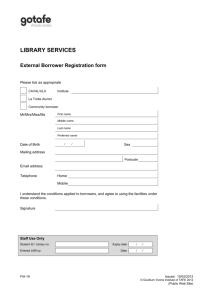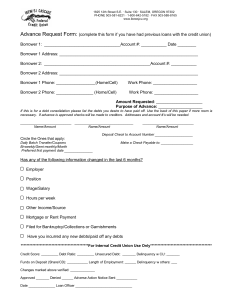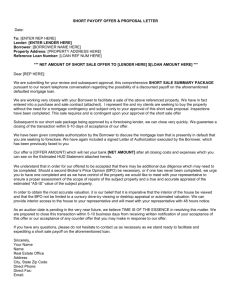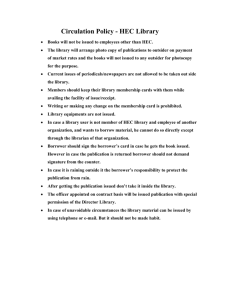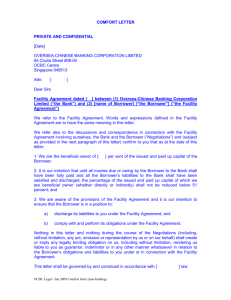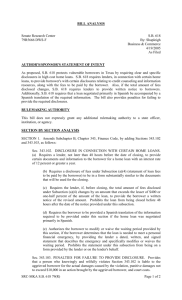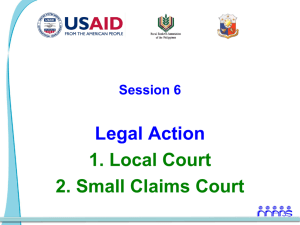Credit Practice Questions 1) The three C's of credit are: a) Character
advertisement
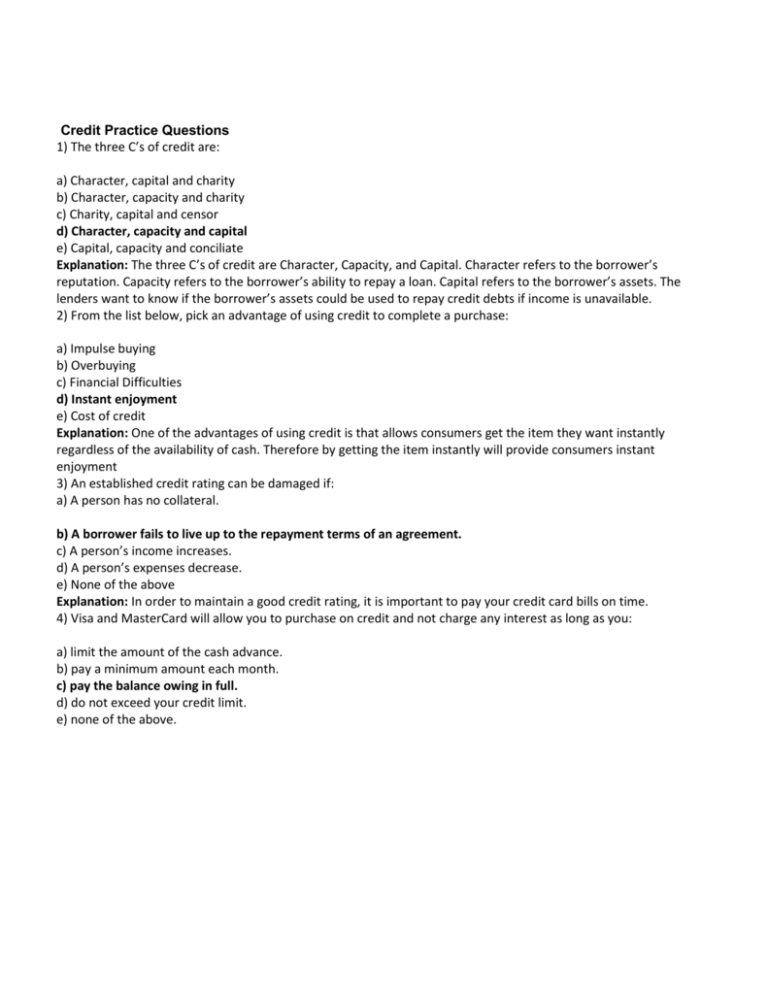
Credit Practice Questions 1) The three C’s of credit are: a) Character, capital and charity b) Character, capacity and charity c) Charity, capital and censor d) Character, capacity and capital e) Capital, capacity and conciliate Explanation: The three C’s of credit are Character, Capacity, and Capital. Character refers to the borrower’s reputation. Capacity refers to the borrower’s ability to repay a loan. Capital refers to the borrower’s assets. The lenders want to know if the borrower’s assets could be used to repay credit debts if income is unavailable. 2) From the list below, pick an advantage of using credit to complete a purchase: a) Impulse buying b) Overbuying c) Financial Difficulties d) Instant enjoyment e) Cost of credit Explanation: One of the advantages of using credit is that allows consumers get the item they want instantly regardless of the availability of cash. Therefore by getting the item instantly will provide consumers instant enjoyment 3) An established credit rating can be damaged if: a) A person has no collateral. b) A borrower fails to live up to the repayment terms of an agreement. c) A person’s income increases. d) A person’s expenses decrease. e) None of the above Explanation: In order to maintain a good credit rating, it is important to pay your credit card bills on time. 4) Visa and MasterCard will allow you to purchase on credit and not charge any interest as long as you: a) limit the amount of the cash advance. b) pay a minimum amount each month. c) pay the balance owing in full. d) do not exceed your credit limit. e) none of the above. 5) A good credit rating is established by a) being a nice person b) making your payments on time c) making your payments a little past their due date d) not making any payments on your credit card e) being a terrible person 6) This “C” refers to the borrower’s reliability and trustworthiness. a) character b) cost c) capacity d) capital e) collateral 7) Which of the following is a disadvantage of credit? a) Impulse buying b) Emergencies c) Savings d) Convenience e) Instant enjoyment Explanation: Impulse buying is an unplanned decision to buy a product or service, made just before a purchase. 8) A person or business that is owed money is a _______________. a) Creditor b) Debtor c) Investor d) Financial institution e) None of the above 9) Mrs. Campbell has approached you to borrow money. You decide to give her $2 500 at 4.5% for 7 weeks. Approximately how much money does Mrs. Campbell owe you all together? a) $112.50 b) $15.14 c) $2,612.50 d) $2,515.14 e) $90.00 Explanation: The 4.5% interest rate in the question is the annual interest rate. Therefore we need to adjust the interest rate for 7 weeks. Since there are 52 weeks in a year: Total loan=$ 2,500*[2500*(0.045*7/52)] = $2,515.14 10) An indication of the level of risk that someone would pose if credit were granted to them, is called: a) failure rate b) risk management c) liability d) credit rating e) debt worthy Explanation: Credit ratings are prepared by credit bureaus, which keep a record of the borrowers’ payment history. Therefore the better the credit rating you have, the more likely you would be willing and able to pay the outstanding balance. 11) A business that gathers credit information on all borrowers in a particular region for the purpose of selling that information is called a(n) a) credit union b) credit bureau c) bank d) trust company e) insurance company Explanation: TransUnion Canada and Equifax are examples of credit bureaus 12) Ms. Thomson has approached you to borrow money. You decide to give her $7,500 at 6.5% for 10 weeks. Approximately how much money does Ms. Thomson owe you all together? a) $487.50 b) $48.75 c) $2,612.50 d) $7,593.75 e) $7,548.75 Explanation: The 6.5% interest rate in the question is the annual interest rate. Therefore we need to adjust the interest rate for 10 weeks. Since there are 52 weeks in a year: Total loan= $7,500*[$7,500*(0.065*10/52)] = $7,593.75 13) You can start building a good credit history by a) Attending school regularly and getting good marks b) Getting a part-time job c) Buying a few things on credit and paying the bills promptly d) Becoming a regular customer at one store e) All of the above
